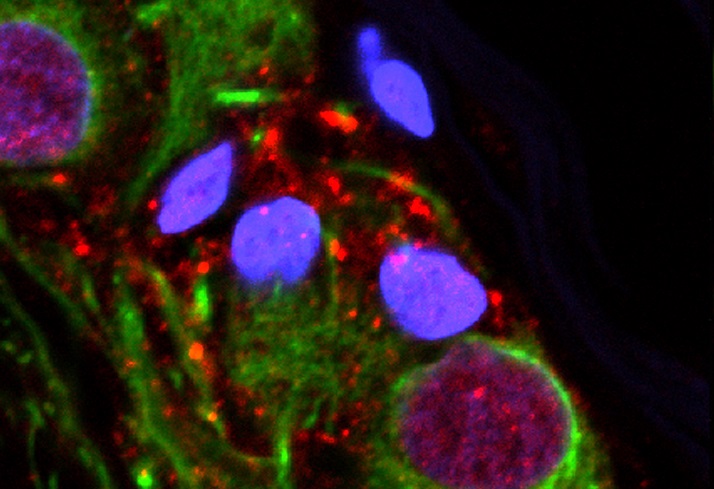
In June, I will be travelling to Kyoto, Japan, for the fifth World Parkinson Congress (WPC). WPC is a global Parkinson’s event that opens its doors to all members of the Parkinson’s community, from neurologists and researchers to those living with the disease. Since my diagnosis in August 2017, I’ve launched the podcast When Life Gives You Parkinson’s. As an extension of that podcast, I have teamed up with the World Parkinson Coalition to help preview WPC 2019.
David Sangster, an ambassador for the World Parkinson Congress, is having Deep Brain Stimulation (DBS) surgery on April 3. It’s a treatment used for late-stage Parkinson’s disease that involves surgically implanting electrodes into the brain. The electrodes deliver small electric pulses that help reduce slow movement, tremor and stiffness.
Sangster was diagnosed in 2011 and lives with severe tremoring and twitching, dyskinesia, rigidity and more. He chatted with me on the podcast a couple weeks before surgery.
I asked if he was nervous.
“No. I just feel ready, I think. I know the risks. It’s worth it,” he said.
He’s documented his journey to DBS on his YouTube channel. His coming out party after the surgery will be attending the WPC2019 in Kyoto.
There will be a lot of researchers at the congress, too, and for good reason. According to Dr. Simon Stott, “There is never a good time to have Parkinson’s, but now is the most dynamic time for Parkinson’s research.”
Stott is the deputy director of research at The Cure Parkinson’s Trust in the U.K. and his website, Science of Parkinson’s, is plain English information about the research conducted on Parkinson’s. He’s been researching for the last 15 years.
“When I first got into Parkinson’s research, there was one or two clinical trials that were looking at disease modification of Parkinson’s. That is slow, stop or reverse the condition. And now there is just dozens and dozens.”
While he does get excited about the research, Stott is wary of expressing it too much, because he doesn’t want to raise people’s expectations. He explains that high expectations can impact research results by triggering a placebo effect and cause the group not getting the treatment to think the treatment is having beneficial effects. Additionally, Stott notes that 95 per cent of treatments that have gone to clinical trials thus far have failed, so it’s prudent to approach whatever you’re testing with an assumption that it is going to fail.
Each episode of the WPC2019 Podcast, I’m going to check in with James Heron, the executive director of the Japanese Canadian Cultural Centre, to teach us a new word or phrase and help us better understand Japan’s culture so we can avoid embarrassing ourselves or offending our hosts. This episode, Heron teaches us the Japanese toast, “Kanpai!” It really means “dry cup” and is the equivalent to “bottom’s up!” or “cheers!” You can hear the proper pronunciation if you google the phrase online.
The Japanese often remove their shoes when entering a home or restaurant. Heron says when it is expected that you remove your shoes, it will be apparent. When you do take your shoes off, there is usually a set of slippers they’ll give you. Heron notes that in a traditional restaurant this will get you from the entrance to the tatami mats, where you will remove your slippers before sitting down in your socked feet. Most of these restaurants will also have a second set of slippers for the washrooms. Be sure to remove the washroom slippers and put your restaurant slippers back on before returning to your tatami mat.
Lastly, April is Parkinson’s Awareness Month. One way you can help spread the word about Parkinson’s is to share your story with family, friends, colleagues, Facebook communities, or local events sponsored by Parkinson’s support organizations. If you’re not ready to share your own story, you can share this podcast. The more we tell our stories, the more awareness we generate around Parkinson’s and the easier it is to raise money for research that hopefully, one day, leads to a cure.

Get weekly health news
Follow me, Larry Gifford
Twitter: @ParkinsonsPod
Facebook: Facebook.com/ParkinsonsPod
Instagram: @parkinsonspod
For more information on the World Parkinson Congress, head to www.WPC2019.org.
Facebook: Facebook.com/WorldPDCongress/
Twitter: @WorldPDCongress
YouTube: WorldPDcongress
Instagram: @worldpdcongress
Thank you to:
David Sangster, ambassador to WPC2019
Dr. Simon Stott, deputy director of research at The Cure Parkinson’s Trust and Science of Parkinson’s
James Heron, executive director of the Japanese Canadian Cultural Centre
If you have a comment or question about the podcast, you can email us at parkinsonspod@curiouscast.ca.
When Life Gives You Parkinson’s was selected as one of Apple’s best podcasts of 2018.
We LOVE that you are loving the “When Life Gives You Parkinson’s” podcast! If you haven’t subscribed yet — what are you waiting for?
Subscribing’s easy! Here’s how…

- Open the Apple Podcasts app, search for “When Life Gives You Parkinson’s” and select it from the list of results.
- Once on the When Life Gives You Parkinson’s page, click the “Subscribe” button to have new episodes sent to your mobile device for free.
- Click the name of an episode from the list below to listen.

- Open the Google Podcasts app, search for “When Life Gives You Parkinson’s” and select it from the list of results.
- Once on the When Life Gives You Parkinson’s page, click the “Subscribe” button to have new episodes sent to your mobile device for free.
- Click the name of an episode from the list below to listen.

















Comments
Want to discuss? Please read our Commenting Policy first.